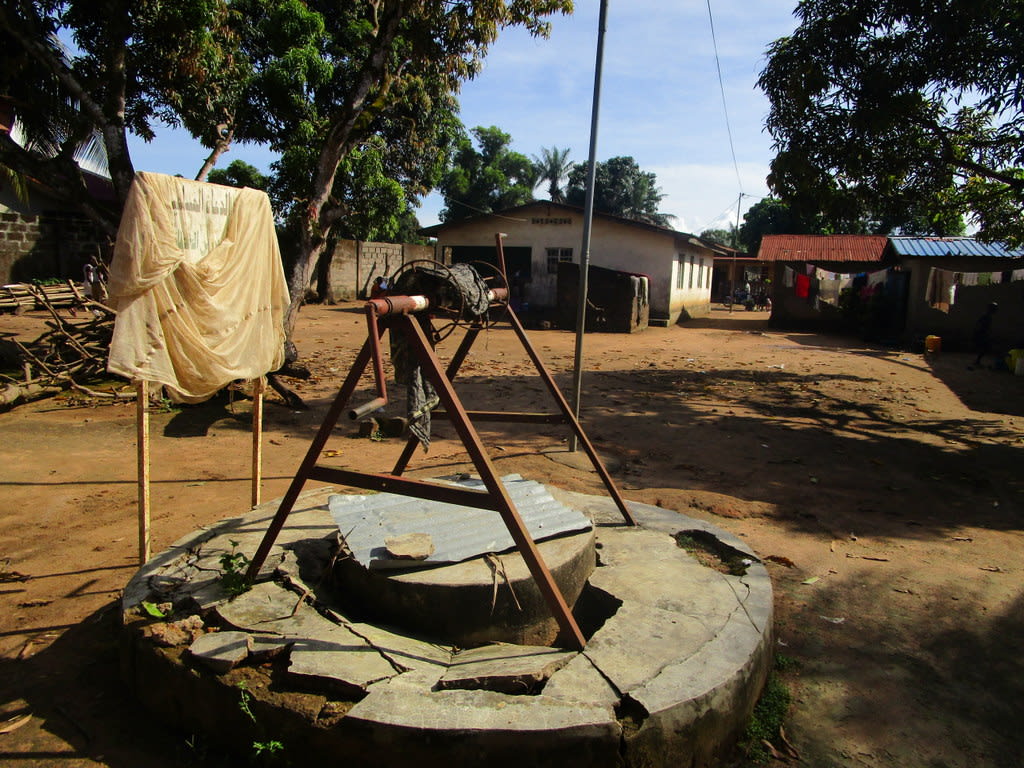The well at 8 BB Kamara Street is a model for a properly maintained water point. The 280 people in this community people prefer fetching water from this water point because the owner allows everyone to fetch free of charge, and when the pump breaks down he uses his own money to make repairs. The water from this water point is always chlorinated and the pump area is kept clean.
There is just one problem: It goes dry for three months out of the year.
The well owner must strictly ration water, forcing people to seek alternate sources like this open well:

These three dry months in the area expose people to unsafe drinking water, causing an increase in cases of waterborne illness for the community.
The owner of the well has volunteered to gather the manpower that is needed to see this project through. His family is going to cook and launder the clothes for the drill team.
Well Rehabilitation
The well marked for this overhaul is dry for three months every year and needs major work to supply adequate, clean water to the community year round. The pump will be removed, and a hand auger will be lowered inside and powered by a drill team. This hand auger will allow the team to drill several meters deeper to hit a sufficient water column that will ensure the well supplies water throughout all seasons.
As the team drills, casing will be installed, transforming the bottom of this hand-dug well into a borehole. PVC piping will connect this lower system directly to the pump, a construction that we know will also improve the quality of water.
Once this plan is implemented, everyone within the community will have access to safe drinking water in both quality and quantity, even through the dry months.
Hygiene and Sanitation Training
There will be hygiene and sanitation training sessions offered for three days in a row.
No handwashing stations were observed here. After our visit, the hygiene and sanitation trainer decided it would be best to teach community members how to build a tippy tap (a hand-washing station built with a jerrycan, string, and sticks). They will use these tippy taps for handwashing demonstrations, and will also teach about other tools like dish racks and the importance of properly penning in animals.
These trainings will also strengthen the water user committee that manages and maintains this well. They enforce proper behavior and report to us whenever they need our help solving a serious problem, like a pump breakdown.
About the Community
It is an urban area with a bustling business community just a few minutes down the road from the Port Loko motor vehicle park. Noise is in high supply as people quest for their daily bread. People move about the community all throughout the day and night.
Every compound is surrounded by green vegetation ranging from fruit trees to varieties of vegetables. The fruits and vegetables on private properties are well-guarded because in this part of the country, everything is for sale. The beautifully covered green landscape shows you it is still the rainy season. Puddles of water settle along the street and corners of some homes, making it an obstacle course when on foot. The footprints and motorcycles tire marks are all calculated to prevent treading in puddles of water.
To be considered a well-to-do family, living in a house built with cement blocks is most of the time considered a prerequisite. The homes made from blocks with cement plastering have the luxury of enjoying cool interiors during the dry season.
The construction and provision of electrical facilities have greatly improved the lives of most of the community members. Fans and refrigeration facilities are now available to the common man, at certain times during the day and night one can enjoy a cold drink of water or sit in front of a cool breeze.

 Borehole Well and Hand Pump
Borehole Well and Hand Pump



































